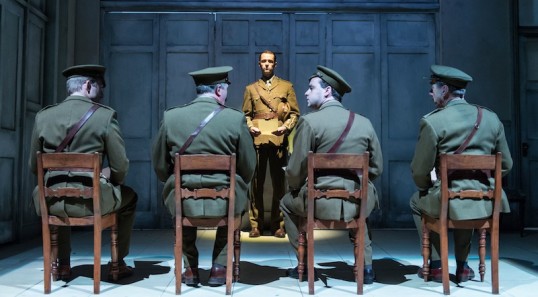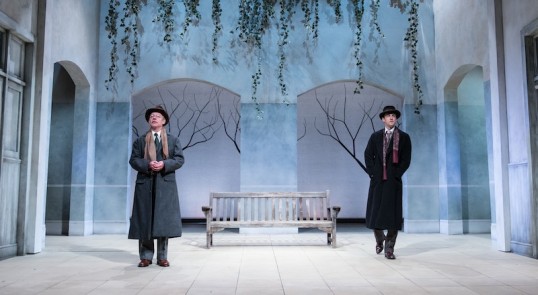Regeneration
★★★☆☆ Timely adaptation
King’s Theatre Tues 30 Sept – Sat 4 Oct 2014
Flawed but utterly human, the touring production of Regeneration at the King’s all week tries to do too much, but is extremely valuable nonetheless.
Nicolas Wright’s adaptation of Pat Barker’s trilogy of novels about World War One is set largely in Craiglockhart Hospital in Edinburgh. The poet and soldier Siegfried Sassoon has been sent there to be treated by Dr Rivers, whose Freud-derived ‘talking cures’ were considered highly unorthodox at the time.
Sassoon does not believe himself to be suffering from ‘shell shock’ like the other patients, who include the aspiring poet Wilfred Owen. Instead, Sassoon owes his presence there to his friend and fellow writer Robert Graves, who has pulled strings to have Sassoon admitted rather than face a court martial after speaking out against the conduct of the war.
Unlike the celebrated film, the current adaptation (for the Touring Consortium Theatre Company and the Royal and Derngate, Northampton) includes material from the later books in the trilogy as well as Regeneration itself. This leads to a rather uncomfortable structure, with the last couple of scenes feeling tacked-on.
The effect of the horrors of war on the patients is cleverly done, with George Dennis’s sound and Lee Curran’s lighting effects being all the more powerful for being sparingly used. However, this just points up the comparative drabness and formality of some of the staging and performances.
Alex Eales’s set is apt and functional, but the production falls into the all too common trap of overusing parts of the set. There are sliding doors on stage that are opened and closed at every possible opportunity, to the point where it becomes distracting.
a dignified and thoughtful figure
The atmosphere in Craiglockhart is claustrophobic, with the buttoned-up officers not able to express their feelings and problems. This means that there is a lack of variety at times in the performances. Attempts to compensate for this lead to a cartoonish quality in some of the smaller roles – Christopher Brandon’s Graves suffers particularly in this regard.
Tim Delap (Sassoon) cuts a dignified and thoughtful figure without ever really convincing as someone with a deep inner conflict. Similarly, Stephen Boxer’s Dr Rivers is an impressively human portrayal, but fails to convince on some levels. Hints are given as to his background and motivations, but the removal of so much of the story means ultimately he lacks depth.
The doctor’s unease at ‘curing’ his patients simply to send them back to be killed should be brought into sharp relief by the episode when he witnesses Yealland, another doctor, administering electric shock treatment to a mute patient. This has an undeniable theatrical impact, but Simon Coates’s Yealland is portrayed as an out-and-out sadist, which diminishes the moral dilemma Rivers faces.
Wilfred Owen is winningly played by Garmon Rhys, showing an almost puppyish devotion to Sassoon, although once again there is a truncated, unsatisfactory air to the scenes where they edit Owen’s poetry.
Prior, the working-class soldier who has become an officer, and the only major character not based on a real person, benefits from the most convincing performance. Jack Monaghan manages to convey a tortured mixture of emotions and impulses while retaining the audience’s sympathy.
Prior’s treatment by others – even the outwardly sympathetic Rivers believes him to have less imagination than those born into the ‘officer class’ – is one of the many strands of the story that cannot be fully developed in the time available. Class conflict jostles with questions of honour and duty, sexuality, family, religion, personal responsibility and guilt – and that is before any question of the morality of war is considered.
Wright and director Simon Godwin deserve credit for fashioning a largely cohesive whole when the scope, complexity and ambition of the play could have caused it to fall apart. If there are some drawbacks in the production, it rarely drags.
It is also a very timely production, not least because much of the recent coverage of events of a century ago seems to have gone back to propaganda of the time, depicting the war as a necessary occurrence or even as a great adventure. In recapturing the horror the war visited on its participants, this production does something important and necessary.
Running time 2 hours 30 mins including interval
King’s Theatre, 2 Leven Street EH3 9LQ
Tuesday 30 September – Saturday 4 October 2014
Evenings 7:30pm; Matinees Wed and Sat 2:30pm
Tickets from: www.edtheatres.com/regen
Tour website: www.theatrecloud.com
| Regeneration on tour: | |||
|---|---|---|---|
| 30 Sept – 4 Oct | Edinburgh King’s Theatre |
0131 529 6000 | Book online |
| 7 – 11 October | Bradford Alhambra Theatre |
01274 432000 | Book online |
| 14 – 18 October | Nottingham Theatre Royal |
0115 989 5555 | Book online |
| 21 – 25 October | Cheltenham Everyman Theatre |
01242 572 573 | Book online |
| 28 Oct – 1 Nov | Richmond Richmond Theatre |
0844 871 7651 | Book online |
| 4 – 8 November | Wolverhampton Grand Theatre |
01902 42 92 12 | Book online |
| 11 – 15 November | Darlington Civic Theatre |
01325 486555 | Book online |
| 25 – 29 November | Blackpool Grand Theatre |
01253 290 190 | Book online |
ENDS



















